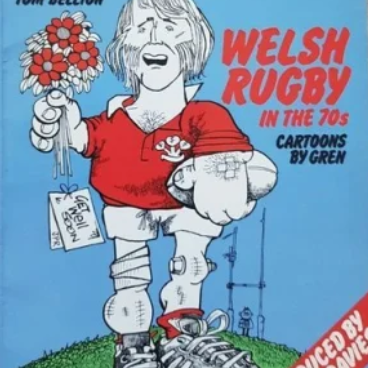The pre-match talk of Wales England was dominated by threat of strike action. However, this is not the first time Rugby has been distrupted by strikes. Here are a 14 instances from the last 111 years of when strikes have halted or threatened to halt rugby matches in the past.
1912. The National Coal Strike
The national coal strike of 1912 was the first national strike by coal miners in the United Kingdom. Its main goal was securing a minimum age. After 37 days, the government intervened and ended the strike by passing the Coal Mines Act, extending minimum wage provisions to the mining industry and certain other industries with many unskilled manual jobs.
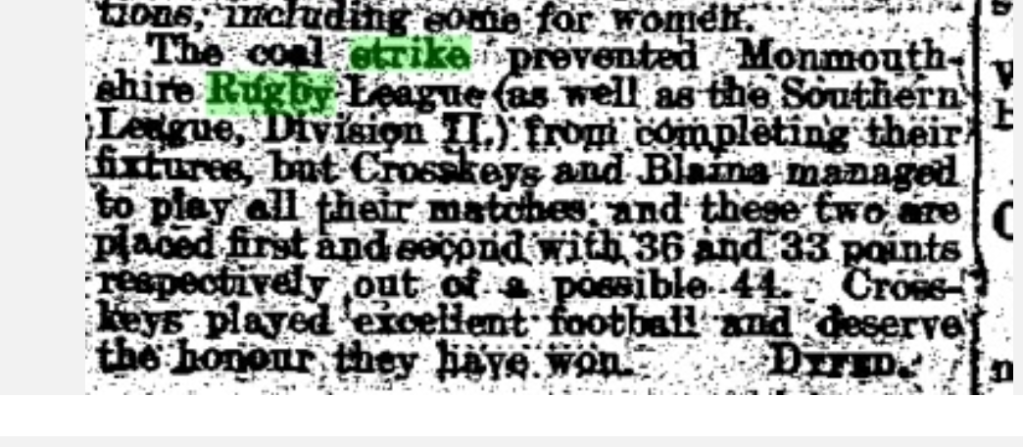
The coal strike prevented Monmouthshire Rugby League from completing their fixtures. Cross Keys and Blaina managed to play all their fixtures and as a result came first and second! Brynmawr had to cancel their fixtures against Weston Super-Mare, Pill Harriers and Talywain meaning a big loss to the club. Losing the Pill Harriers match was a blow as it attracted a big gate!
The strike caused considerable disruption to train and shipping schedules and Catford Rugby Club were one of the clubs affected as they had to cancel their annual Easter tour to the Midlands!
1920. Wigan Rugby League Strike
Rugby League was a Professional sport and players were often looking for financially better terms. Strikes often happened when negotiations broke down.

In February 1920, Wigan Rugby League side refused to play against Swindon. In August of the same year, the Salford Rugby League were also on strike for better pay. This was a common theme for the next 50 years.
There was Leigh Rugby League Club in 1931 who went on strike having refused to accept lower wages offered them by the directors. Owing to trade depression and the poor response from the public, the directors argued that they did not feel justified in paying the old rate of wages. The players were asked to accept a lower wage for the remainder of the season, but refused.
In 1947, Leeds threatened to strike against Wigan if they were not given £27 a win. In 1948, Hunslet also went on strike having refused to accept last season terms of £7 for win, £5 for a draw, £3 for a defeat. Several members of the second team backed them up, so club officials were last night touring Leeds and district in cars in search Junior players to make up a team. There was also Oldham (1959) Hunslet (1970), St Helens (1976). There may have been many more…
1921. Black Friday
On 31 March 1921, coalmines were returned to private ownership. The miners’ union refused to accept the owners’ new terms, and on 1 April 1921 one million British miners were locked out. The lockout lasted for three months, with the miners returning to work in early July 1921.
It was anticipated that the National Union of Railwaymen and the National Transport Workers’ Federation would call for a national rail and transport strike in support of the miners, however, on 15 April, it was announced that they would not recommend action.
The Triple Alliance fell apart, and this fracturing of support was named ‘Black Friday’.
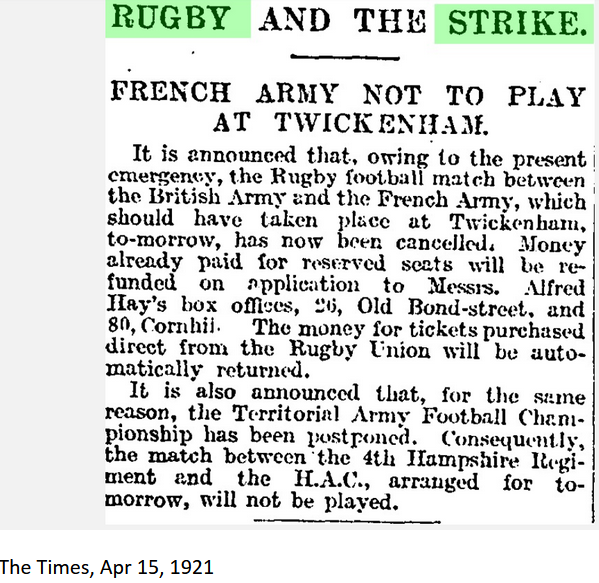
It seems that the Army was on standby for possible conflict or rioting! One certain Rugby match became a victim of what the Times described as the ‘present emergency’ and the match between the Franch Army and British Army at Twickenham was cancelled.
1927. All Blacks Strike
This is certainly one of the more unusual strikes to have taken place. The 1926–27 New Zealand rugby league tour of Great Britain was marred by player dissatisfaction and a strike involving seven players!
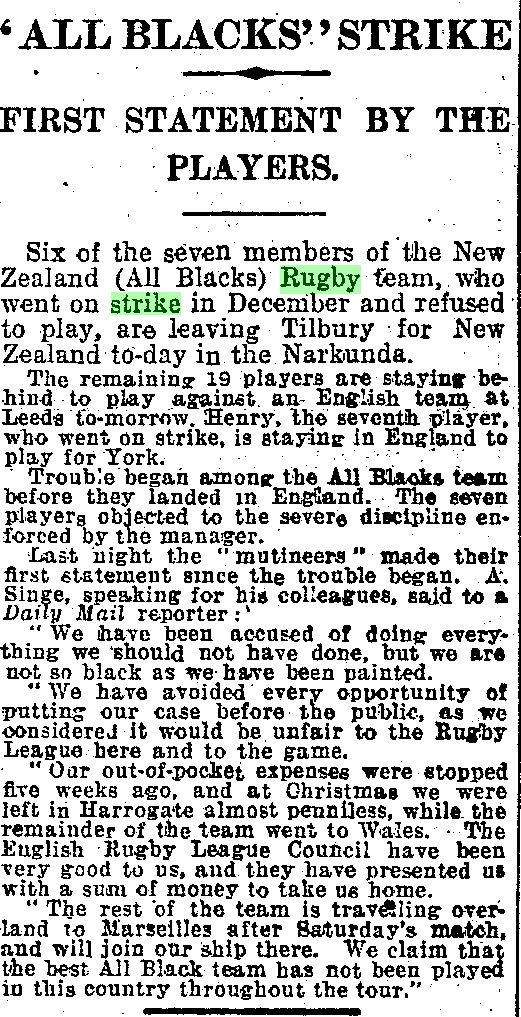
Six of the seven members of the New Zealand (All Blacks) Rugby team who went on strike in December and refused to play, left Tilbury for New Zealand leaving the remaining 19 players behind to play against an English team at Leeds tomorrow. Henry, the seventh player, who went on strike is staying in England to play for York. Apparently, trouble began before they landed in England as seven players objected to the severe discipline forced by the manager.
Their out-of-pocket expenses were stopped, and at Christmas, they were left in Harrogate almost penniless, while, the remainder of the team went to Wales.
There were several skirmishes within the Kiwi party and a rift developed between Ernest Mair, tour manager and coach and seven forwards. The disputes continued once the party arrived in Britain, with one of the rebels being involved in a street fight with another member of the tour party after the opening match. At a meeting with English Rugby League authorities in on 8 November, following further disturbances which almost led to the tour party being evicted from their Harrogate hotel, it was decided that Mair would withdraw from team selection and match tactics for a period of a month.
The tour, and the costly disputes, continued with the rebels eventually setting sail for home a week earlier than their colleagues. Three months later all seven players were banned for life by the New Zealand authorities. New Zealand did not visit Europe again until 1939.
1935, Frickley Colliery Strike over Rugby player
Frickley & South Elmsall Colliery was one of the largest deep coal mines in the United Kingdom and located near Wakefield. The colliery became a key source of union radicalism and was one of the last pits to return to work after the 1984 strike, seeing as it was picketed by a group of hardliners from Kent who continued to picket Frickley after the NUM had called off the strike. Frickley was also the location of a ‘lighting strike’ over a rugby player in 1935!
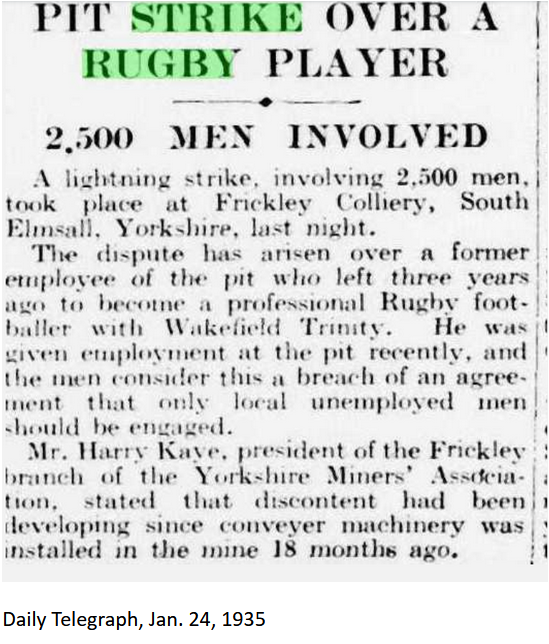
A lightning strike, involving 2,500 men, arose over a former employee of the pit who left three years ago to play Rugby League for Wakefield Trinity. He was given employment at the pit and the men men consider this a breach of an agreement that only local unemployed men should be engaged!
1951 Western Region Rail Strike, Newport v Blackheath
‘The Rugby club a strike couldn’t stop’
There was threat of a National Rail Strike in 1951 over wages but last minute settlement avoided a full-on strike. However, many depots continued to go on strike and there was much disruption and the Paddington train intending to take Blackheath to Newport was cancelled.
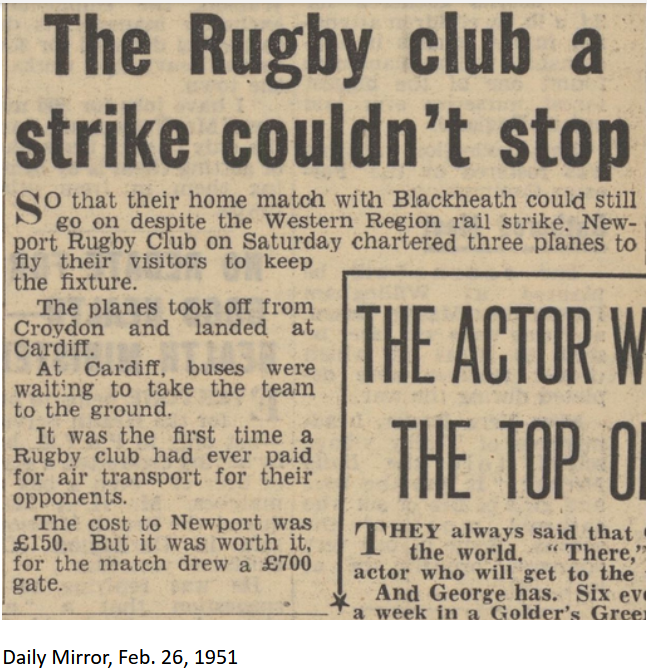
On hearing of the cancellation, Bill Everson, former Wales international and Newport Secretary, phoned Blackheath and requested them to charter a plane at Newport’s expense so that their home match with Blackheath could still go on despite the disruption caused by the Western Region rail strike. Newport Rugby Club chartered three planes to fly their visitors to keep to keep the fixture. The planes took off from Croydon and landed at Cardiff where buses were waiting to take the team to the ground. It was the first time a Rugby club had ever paid for air transport for their opponents. The cost to Newport was £150. But it was worth it, for the match drew a £700 gate.
1969-70, Postal strikes as Springboks play in Ireland
In 1970 at the height of Apartheid control in South Africa, the Springboks played Ireland at Lansdowne Road. The South African rugby tour of Ireland and Britain throughout 1969 and 1970 resulted in protests and
demonstrations across Dublin and at Lansdowne Road at the match on 10 January 1970.
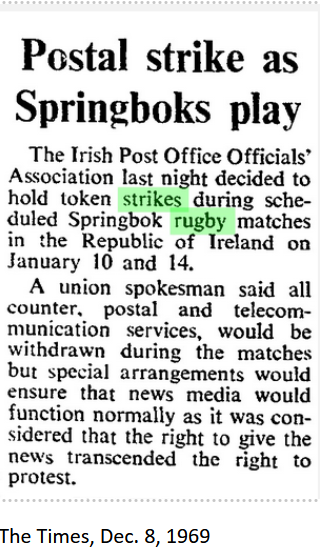
According to the Times: ‘The Irish Post Office Officials’ Association last night decided to hold token strikes during scheduled Springbok rugby matches in the Republic of Ireland on January 10 and 14. A union spokesman said all counter, postal and telecommunication services, would be withdrawn during the matches but special arrangements would ensure that news media would function normally as it was considered that the right to give the news transcended the right to protest. A spokesman said that Press telephone links would not be cut.’ I wonder if this strike did take place in the end?
1972 Miners Strike
The 1972 UK miners’ strike was a major dispute over pay between the National Union of Mineworkers (NUM) and the Conservative government and lasted for over 6 weeks.
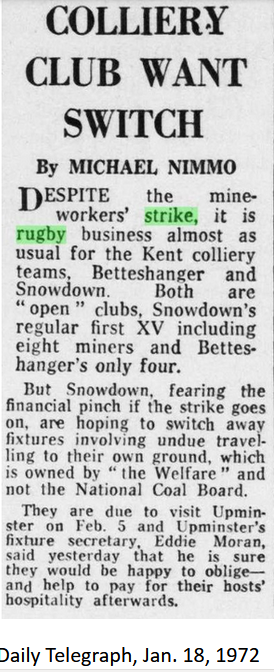
During the 1972 Miners Strike, it is rugby business almost as usual for the Kent colliery teams, Betteshanger and Snowdown. Both are “open” clubs, Snowdown’s regular first XV including eight miners and Betteshanger’s only four. But Snowdown, fearing the financial pinch if the strike goes on, are hoping to switch away fixtures involving undue travelling to their own ground, which is owned by “the Welfare” and not the National Coal Board. They are due to visit Upminster on Feb. 5 and Upminster’s fixture secretary, Eddie Moran, said yesterday that he is sure they would be happy to oblige— and help to pay for their hosts’ hospitality afterwards.
1974, Cwmbran RFC Strike
One of the more unusual threats to strike was at Cwmbran RFC in 1974.
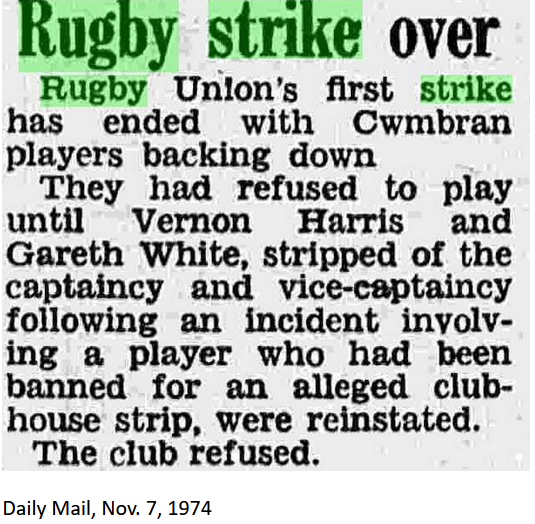
Rugby strike over Rugby Union’s first strike has ended with Cwmbran players backing down, They had refused to play until Vernon Harris and Gareth White, stripped of the captaincy and vice-captaincy following an incident involving a player who had been banned for an alleged clubhouse strip, were reinstated. The club refused.
1996. Alan Barham, the Referee who refused to strike
It wasn’t just players who went on strike. Referees also went on strike as happened in Wales in 1996.
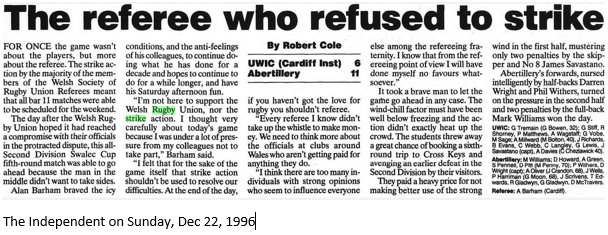
The majority of referees of the Welsh Society of Rugby Union Referees went on strike in December 1996 but one referee didn’t want to take sides. Alan Barham braved the icy conditions, and the anti-feelings of his colleagues, to continue do what he has done for a decade and was available to referee the fifth-round match between UWIC and Abertillery.
“I’m not here to support the Welsh Rugby Union, nor the strike action. I thought very carefully about today’s game because I was under a lot of pressure from my colleagues not to take part,” Barham said. “I felt that for the sake of the game itself that strike action shouldn’t be used to resolve our difficulties. At the end of the day, if you haven’t got the love for rugby you shouldn’t referee. Barham also said: ‘Every referee I know didn’t take up the whistle to make money. We need to think more about the officials at clubs around Wales who aren’t getting paid for anything they do’.
Referees were soon back on the field and the threatened Boxing Day programme went ahead. The Welsh Society of Rugby Union Referees, voted to end the long-running dispute with the Welsh Rugby Union over the payment of match fees to officials, which had brought a near-total withdrawal of services. As a result, Referees officiating at Welsh National League First Division matches will be paid £150, with the senior touch judge receiving £50 and the other £25. Those in charge of Second Division matches will receive £100, with the senior touch judge again getting £50; the Third Division will see payments of £50 and £25 respectively while fees for both Fourth and Fifth Division matches will be £30 and £15. The package will cost the WRU more than £71,000 for each full season
1999. Maesteg go on strike
It was not until 1995 that Rugby Union was declared an “open” game, and thus professionalism was sanctioned by the code’s governing body, World Rugby. Are Maesteg the first team in history to go on strike in Rugby Union following the advent of Professionalism?
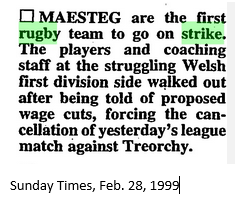
Players and coaching staff at Maesteg RFC went on strike in 1999 after being told of proposed wage cuts forcing cancellation of league match against Treorchy!
2000. England rugby players go on strike
A dispute over pay nearly saw a team of amateurs represent England at Twickenham Stadium in 2000! This was possibly the most famous strike of the them all and one that got little sympathy from the Press or even their coach, Clive Woodward.
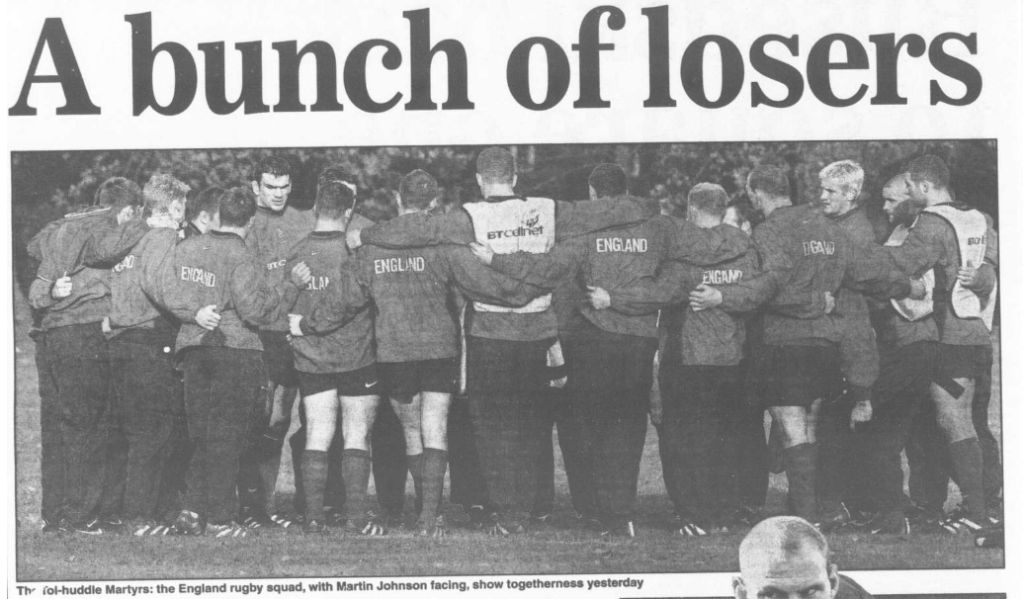
The most famous incident was in 2000 when the England rugby team went on strike. They were demanding a higher match fee and less of a win bonus. Clive Woodward was furious calling it ‘Rugby’s darkest day’ ahead of the England game against Argentina, a country ironically had not accepted Professionalism in Rugby Union at the time!
“The players regard the RFU’s approach as old-fashioned, patronising and arrogant,” Martin Johnson said. “The RFU exhibit a feudal, archaic attitude to the players. It’s sad that it has come to this. The issue here is one of principle. We want a fair deal. Most rugby players earn an annual salary in line with the weekly earnings of a Premiership football player, so there’s no question of greed being a factor here.”
A deal was reached and the Argentina England match went ahead. There appeared to be little sympathy and coach Clive Woodward was angry over strike threat. It seems a £50,000 lump payment to be shared by all players brought the matter to an end. For the record, England beat Argetina 19-0.
The strike by England rugby union players was not the first. In September 1996, 42 of the England rugby squad of 43 boycotted training in a row about television money. A year earlier, the entire England rugby team refused to play under anyone except Will Carling. Two days later he was reinstated as captain.
2002. Wales strike threat
The Wales squad have threatened to go on strike for the match against England at Twickenham, that is compounded by the so-called “Gang of Six” (Cardiff, Bridgend, Newport, Pontypridd, Llanelli and Swansea) threatening to withhold theIr players for Wales’ last game in the Championship, against Scotland a fortnight later. If the players go ahead with the strike threat then the Welsh Rugby Union could ban them from representing their country again.
The Gang of Six took out an advertisement in the Western Mail explaining their position. Among other statements the advert claimed: “We have effectively subsidised Welsh rugby at club level and because our players make up the majority of the national team, we have subsidised the national game in the process. We pay for the players and the WRU gets the use of them for international matches, generating income for the WRU … [but] the clubs do not receive enough compensation… from the international revenue tbe WRU obtains from the use of our players… “Instead, the ever-increasing shortfall is met thanks to a few benefactors who, through the love of the game and nothing more continue to prop up Welsh rugby.” The six clubs demand for their annual funding to be doubled to £1.5 miliion per club.
Tony Brown, the English businessman who had transformed Newport from bankruptcy into the boom club of Wales said: ‘to have dialogue and be up front. There must be a degree of mutual trust, which doesn’t appear to be there so the only weapon we have, ultimately, is the players.’ Wales team manager Alan Phillips can only wait and wonder how many of the national squad will report on Sunday to start preparations for the England match. He said: ‘The players are the meat in the sandwich. I feel sorry for them. They have mortgages to pay and families to look after. A decision has to be made sooner than later but I don’t want say any more.’
It got nasty as Ebbw Vale refused Newport owner Brown admission to Premiership match between the clubs. The home club defended action in a statement, claiming: ‘Winston Churchill would never have invited Adolf Hitler to dinner.’ Brown is a member of one the so-called Gang of clubs, whose demands six-team Premiership would almost certainly be Ebbw Vale’s expense. Having signed a 10-year loyalty deal with the WRU, Ebbw Vale say they will legal action to protect status.
The regions were established for the start of the 2003/04 rugby union season as the clubs power base was eroded.
2014. Somoa protest in plea for change
The Samoa players wore blue wristbands during their game against England in 2004 in a small but significant act of protest against the officials who run the sport on the island. Dan Leo, the London Irish lock, claimed that the players have been threatened by officials since taking their grievances over governance and financial transparency to World Rugby (formerly the IRB) in a letter that said they could boycott the match at Twickenham. The squad withdrew their strike threat once World Rugby and the International Rugby Players’ Association (IRPA) agreed to get involved, but the players, emboldened by the support of many leading rugby nations, although not England, remain defiant and determined to force through a revolution.
The blue wristbands will represent the players’ demand for change. They had considered more obvious protests but could not risk being fined by World Rugby because they only earn £500 a week while on international duty. “You will remember the ‘Justice for Bakkies’ campaign that the South Africans did (against the Lions in 2009),” Leo said. “They all got personally fined. We are not in a position where we can afford that, so we have to be very careful.” The Samoa squad launched a social media campaign and they have received support from the New Zealand, Australia, France and Italy teams, all of whom have posted pictures in support of #SamoaUnited. The RFU said that the England squad would not be backing the campaign.
They want to alert the people back home to their protest and to put pressure on the SRU board, which contains two government officials and is chaired by the country’s prime minister, to stand down. “We are going out and getting international teams to support us and the wider rugby community,” Leo said.
England went on to beat Somoa 28-9 at Twickenham.
